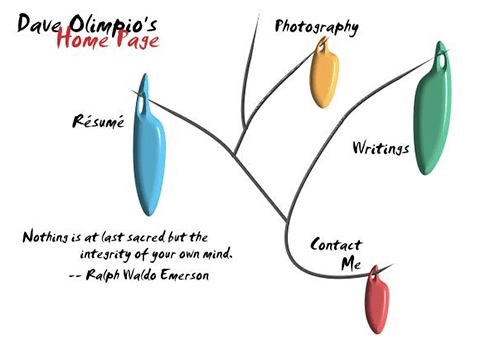A Revolution In the Value of Words
On early websites, cluetrains, and the exchange of value online
In partnership with

I first got into website building at the end of the 1990s, I had just read a work (posted to the Internet) called The Cluetrain Manifesto which made the argument that "markets are conversations" and that the Internet would fundamentally change the relationship between businesses and consumers.
Cluetrain got me drinking the Internet/website Kool-Aid pretty heavily. I wasn't sure how somebody like me, an English major who had never studied computer science, was going to be a part of this digital revolution, but by god, I wanted in, particularly since it had such a poetically-titled manifesto.
I knew I would have to eventually build a website in order to ... build websites for a living. So I picked up a thick textbook at Borders titled "HTML 4" and made my first personal webpage. It was 1999. Here is a screenshot of the homepage:

My first personal web page, circa 1999
It's kind of embarrassing to show this to you. Questionable design choices aside, it wouldn’t be considered very “usable” today. But I was quite proud of it, then. I’d coded it all by hand, and I spent many weekend hours figuring out how to get the navigational menu items (those Miró-like hanging things) to move when you moused over them, and for the text to change color. (These visual tricks were part of what made pages "interactive" back then — I mean, you couldn't do that shit with a newspaper article or a brochure, now could you!)
I kind of love using the Wayback Machine to look at old websites and to see how design and functionality has changed. The first iterations of websites were clunky by today's standards. We were all learning together the kinds of things we could do with this new platform. Much of what we did then seems amateurish now. We didn't have the intuitive understanding for what would work best on a screen, and how that could be different from what had worked for print.
It strikes me that we are in those early innings now with NFTs and blockchain technology. The examples we have now for trying to wrap our brains around NFTs are these square gifs that seem ridiculous to many people. I kind of wonder if Bored Apes or Crypto Punks will end up being kind of like the flashing gifs and animated text of early websites. Even if that’s the case, I still think they will be culturally significant, and therefore have value.

Bored Ape #9528 and Crypto Punk 1040
The real-world uses for cryptocurrencies, NFTs, and smart contracts don't make complete sense to us yet, but I think we will eventually come to depend on them in ways we can not imagine today. Uses will evolve that will make them as indispensable as smart phones and credit cards. If the internet revolutionized the way we exchange information with one another, blockchain will revolutionize the way we exchange value with one another.
Atticus Review values important, emerging, literary writing, and we are already in the business of publishing it on our website. We just met with our first NFT poet, somebody we previously published and who was nominated by a member of the Atticus community, and we will be releasing her poem as an NFT in the coming weeks!
We are welcoming and adapting NFT technology because it offers new opportunities for digital stewardship of the written arts. The first thing you will need, as an NFT author, or NFT collector, is a crypto wallet. Our next newsletter will explain this in greater detail and show you how to get started.
Thanks for reading.
David Olimpio
Publisher
Advertisement
The portfolio that's automatically up to date with your work.

Authory saves you hours with a portfolio that's always up to date.
Get backups of all your articles.
Be ready to impress potential clients and employers, anytime.
